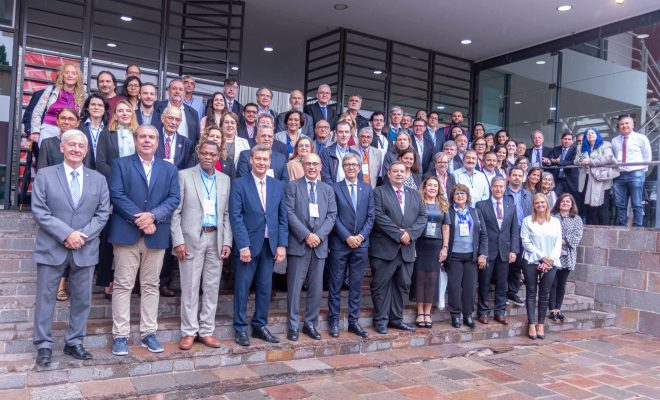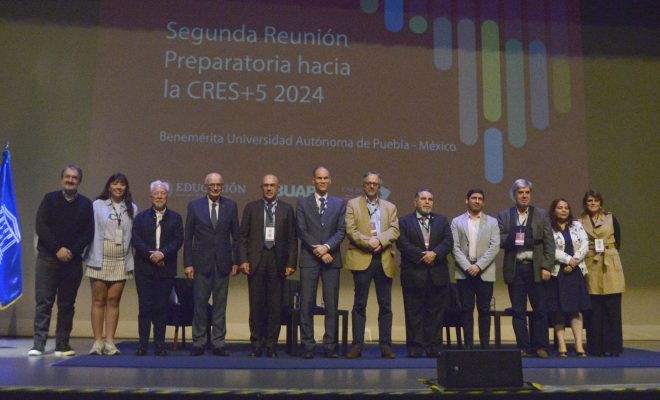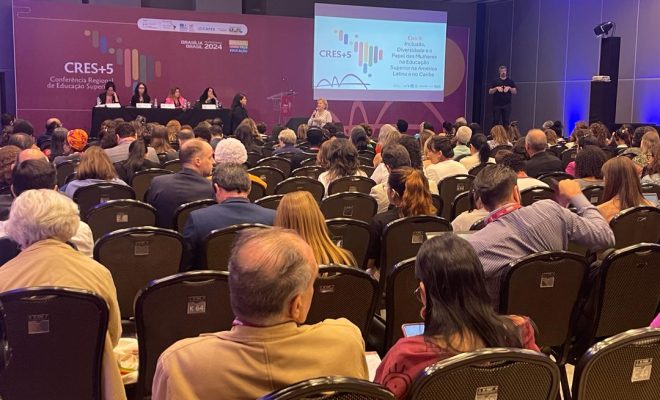Higher education leaders forged a consensus on the topics and participatory methodology for CRES + 5

- According to data shared during the meeting, it is seven times more likely that a person belonging to the most favored strata of society will have access to higher education than a person from the lowest quintile.
- The income of a higher education graduate is 200% higher than that of a high school graduate.
- The estimated graduation rate in higher education in the region is 46%
- The student mobility rate in the region is only 1.25%
On March 22 and 23, five years after the III Regional Conference on Higher Education was held in Córdoba (Argentina), the National University of Cordoba received more than 70 higher education leaders from 15 countries in Latin America and the Caribbean to agree on a common agenda and work methodology for the celebration of CRES + 5, to take place in Brasilia on 13-14 March 2024. This follow-up conference will evaluate the progress of the 2018-2028 Action Plan and the challenges of the post-pandemic in the field of higher education.
The opening ceremony of the meeting in Córdoba featured words from the Rector of the National University of Cordoba, Jhon Boretto, “It is very important that we work on this agenda. Five years ago, at the 2018 CRES, challenges were raised that will have to be reviewed in terms of living in a world marked by an accelerated transformation, by the advancement of science and technology, which are the issues that make our institutions. In addition, there was a pandemic that caused profound transformations, so we must try to intertwine these challenges with what lies ahead of us,” he said.
Víctor Moriñigo, representative of Latin American and Caribbean Space for Higher Education (ENLACES), recalled that higher education is a right, “I hope we continue to walk together in this uncertain world in pursuit of higher education, which is a human right for which we cannot stop fighting.”
Representing the National Inter-University Council (CIN), its President, Enrique Mammarella, stressed the need to strengthen democracies in order to resolve inequalities and inclusion in our people. “The pandemic accelerated our times, we came out ahead with digitalization, but we are in the midst of a digital transformation. Artificial intelligence has arrived, with which there are many issues on this agenda that must be re-discussed, with a regional and global outlook.” He also highlighted that the cornerstone of this follow-up will be around the CRES 2018 Declaration, as well as the 2018-2028 Action Plan.
Oscar Alpa, Secretary of University Policies (SPU), proposed a common course to drive social and economic transformation without neglecting the defense of higher education as a human right and a public good. “Universities are transformers of social reality and accompany economic development. For that we have to review the length of careers, research, extension. In short, the commitment to society. Universities continue to be the most reliable institutions and that, beyond the achievement, is a commitment that we have to maintain and extend to the common Latin American space”.
Francesc Pedró, Director of UNESCO’s International Institute for Higher Education in Latin America and the Caribbean, emphasized: “This meeting is presided over by two principles. On the one hand, that of participation: we want to recover UNESCO’s position in regional and global dialogue as a meeting place for multiple and diverse perspectives, and for it to be recognized as a participatory space. And, on the other hand, transparency: we must add to the CRES 2018 Action Plan how we have changed in these 5 years”.
In his presentation, the Director of IESALC presented data demonstrating the persistent inequalities in the region from the document Advances towards SDG 4 in Higher Education: Challenges and Policy Responses in Latin America and the Caribbean. For example, a person from quintile 5 is 7 times more likely to enter higher education than a person from quintile 1.
As a prelude to the debate on the thematic axes in the plenary, Dr. Hugo O. Juri, mentioned the movements of great social resonance on a global scale that have occurred since 2018 such as “Me Too”, populism, the United Nations climate change report, the social protests of 2019, the rise of China as an emerging power and democratic erosion. In this context, he called for universities to evaluate the length and relevance of degrees and highlighted the role of micro-credentials as alternatives to traditional courses and as support for the idea of lifelong learning, as well as strategic to reduce college dropout.
During the discussion sessions, the director of IESALC invited the attendees to reflect on the most pressing questions regarding higher education and the active role of the different actors in these aspects. To the topics proposed during CRES 2018 (sustainable development; higher education as part of the education system; cultural diversity and interculturality; internationalization and integration; social challenges; scientific and technological research and innovation; Cordoba Reform; and teacher training), it was recommended to add towards CRES+5: governance, financing and autonomy; and well-being and participation of the community of higher education institutions. The pandemic and its implications for higher education was approved as a cross-cutting theme.
The working methodology for the CRES+5 will include virtual working groups for each of the themes, with the intention of presenting a final report to CRES+5 and contributing to the final declaration. For their part, the participants committed to include the CRES+5 agenda in their calendar of regional meetings for the collective construction of the themes with the greatest possible participation, for which they recommended including the voices of students and equity deserving groups.
Download the photos from the two-day meeting.








